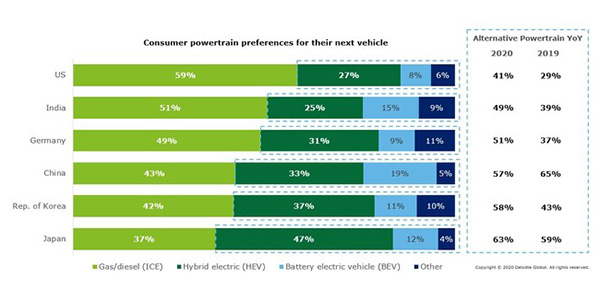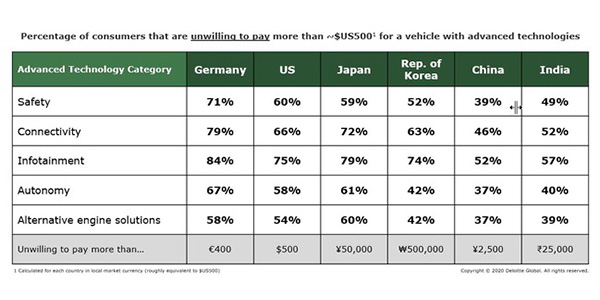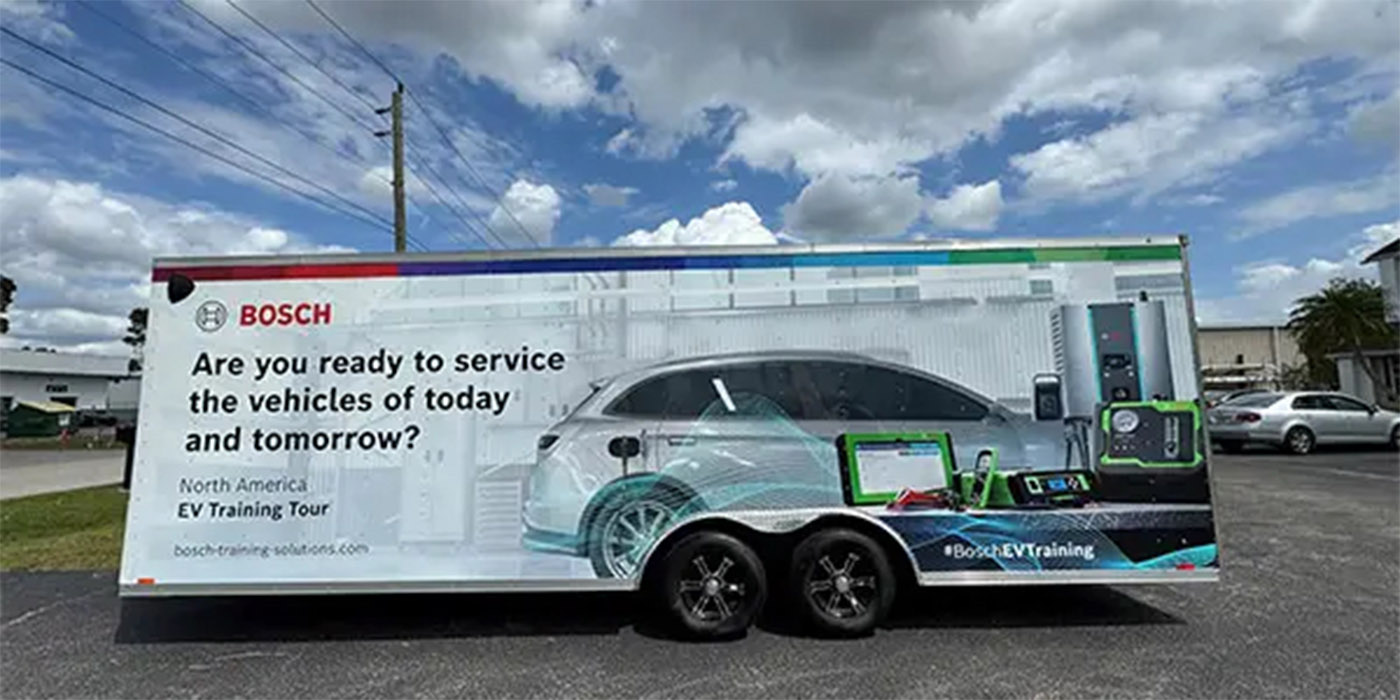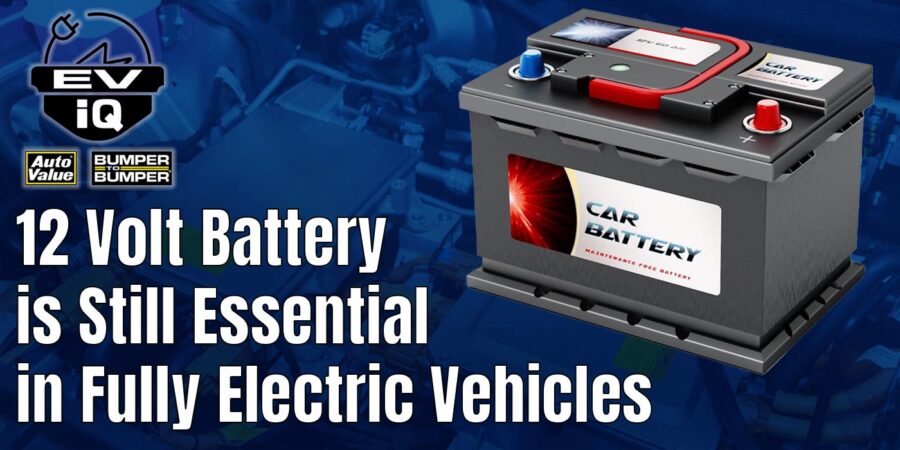Key takeaways
- Most U.S. consumers (63%) believe full battery electric vehicles (BEVs) should have a minimum driving range of 200 miles or more.
- Fifty-eight percent of U.S. consumers think battery operated vehicles are better for the environment when compared to traditional gasoline/diesel vehicles.
- Nearly half of U.S. consumers (48%) believe that fully autonomous cars will be unsafe.
- More than half (58%) of U.S. consumers indicated they are not willing to pay more than $500 for autonomous vehicle (AV) technology.
Why this matters
Deloitte surveyed more than 35,000 driving-aged consumers, from 20 countries, across the globe. Conducted online, the study helps to provide insights into a variety of critical issues impacting the automotive sector.

Demand for electrified vehicles accelerates
Automakers still have reason to invest in developing new powertrain technologies, as interest in alternative-fuel vehicles is rising in several global markets and in many countries policy makers are implementing stronger environmental policies. In the U.S., where a combination of a more restrained environmental policy, low fuel prices, and tight incentives have kept interest in hybrid and fully electric vehicles largely at bay, 41% of consumers said they are actively considering an alternative-fuel vehicle (including hybrid electric, and battery-powered electric) in the future, up from only 29% last year.
“Technologies in the alternative powertrain domain appear to be advancing to a point where they have offset some of the concerns we have seen over the past decade. However, to encourage the consumer uptake of advanced vehicle technologies, the automotive ecosystem still has some work to do in terms of making EVs as easy and convenient as internal combustion engines, lowering the cost of EVs, and figuring out just who will build and pay for the charging infrastructure,” said Craig Giffi, vice chairman, Deloitte Insights global managing principal, Deloitte LLP.

EV charging infrastructure: a mixed bag
Despite EV technology improving each year, consumers still need to be convinced battery range and charging infrastructure is worth their EV purchase. Lack of electric vehicle charging infrastructure is the biggest concern for consumers in Republic of Korea, India, U.S. and Japan.
Furthermore, even though 41% of U.S. consumers believe full battery vehicles should have a range of at least 300 miles, the average vehicle owner travels only about 27 miles per day. And surprisingly, a significant proportion of consumers are willing to wait between 30 minutes and one hour to fully charge an electric vehicle. In the U.S., 27% of survey respondents are willing to wait between 30 minutes and one hour, with percentages even higher in Republic of Korea (29%), Germany (30%), India (35%) and China (40%).
Interest in autonomous vehicles stalled in most countries
Consumer perception regarding the safety of self-driving vehicles remains stalled since last year in most countries. In the U.S., nearly half of consumers (48%) think that fully self-driving cars will be unsafe. This apprehension extends to commercial vehicles, as well. More than two thirds (68%) of consumers noted that they were concerned about commercial vehicles operating in autonomous mode on the highway.
Across most global markets covered in this year’s study, just under half of respondents in several countries believed that AV technology will not be safe. In fact, in India and China, the percentage of people that think autonomous vehicles will not be safe has increased to 58% and 35%, respectively. This trend goes hand in hand with consumers’ views on testing autonomous vehicles, with over half of consumers in India (57%) and the U.S. (51%) concerned by the idea of autonomous vehicles being tested in areas where they live.
R&D continues, consumers lack willingness to pay
Original equipment manufacturers continue to spend billions on R&D in advanced vehicle features with the assumption that consumers will pay a premium to gain access to these advanced technologies when they appear on the market. However, results from this year’s study reinforce our past findings that achieving a return on invested capital for new technologies may be more difficult than some automakers think. Notably, consumers in the U.S. (34%) indicate that they are not willing to pay extra for AV technology. And, for those willing to pay anything extra, it does not cover the costs required to develop and deliver the technology.
This reluctance to pay for AV technology is part of a more general unwillingness among consumers in developed economies to spend extra for other types of advanced automotive features such as connectivity. Across the globe, almost half of the survey respondents in Germany (46%), and almost a third in the U.S. (31%) and Japan (28%), indicated they would not pay more for a vehicle that could communicate with other vehicles and with road infrastructure to improve safety.
“Stakeholders across the automotive industry are currently facing challenges when it comes to business models and product portfolios as they are forced to rethink long term investments while not getting left behind. Underlying these massive R&D investments is the assumption that consumers will actually pay for advanced vehicle technologies when they appear on the market. However, as consumer skepticism gains momentum, automakers should rationalize returns on invested capital to remain profitable as consumers’ desires to purchase new technologies continue to wane and shift gears to the realities of electrified vehicles,” said Joe Vitale, global automotive sector leader, Deloitte Consulting LLP.
Vehicle connectivity, privacy and data security concerns remain
When it comes to advantages of increased connectivity in vehicles, consumers are split on whether it’s worth it. People in India (80%) and China (76%) are embracing the idea at over twice the rate compared to Germany (36%), followed by the U.S. (46%).
In the meantime, opinions differ on specific concerns around connectivity, including the security of biometric data generated and shared by connected vehicles. Notably, in India where consumers believe increased connectivity is beneficial, the majority (69%) have concerns about privacy and data security. These same concerns are also high among the majority of other countries, including Germany (62%) and the U.S. (59%). On the contrary, who consumers would trust the most to manage the data being generated and shared by a connected car remains a mixed bag across the globe as automotive OEMs are not necessarily their choice, with fewer than 40% of consumers in most countries selecting OEMs for this role.
For more information on Deloitte’s “2020 Global Automotive Consumer Study,” or to download a copy, visit www.deloitte.com/autoconsumers. Connect with us on Twitter at @DeloitteCB.



